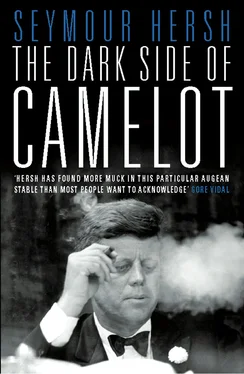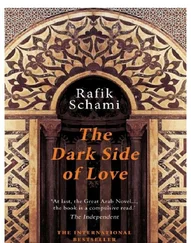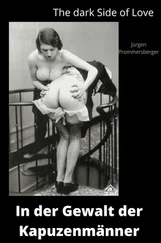“It was glamorous,” she recalled. “It was supposed to be terrific. It was supposed to be just what anybody would want, what any woman would want. During that early time there would be looking at me. There would be nodding at me. There would be leaning across the table to say something just to me. There would be those signs of special attention. Yes, in public. And of course that was very flattering. I thought, ‘Oh, gosh. I really must be quite something.’”
The affair deepened. She fell totally in love with the handsome Kennedy and spent hours, after making love with him, at dinner or in long conversations in bed. “I was absolutely thrilled to the gills,” she told me. “Here I was, twenty years old, having dinner in the White House, the Abraham Lincoln bedroom. It seemed very amazing. There was a time when he needed to make a statement about a certain thing that happened in the world. And [he] went off and came back half an hour later and was really thrilled with the fact that he had come up with six declarative sentences that just laid it out.” Their relationship, the woman said, “was supposed to be secret, and so I just went along and didn’t talk about it.” As for Kennedy’s seemingly ideal marriage to Jackie, she said, “I did not have the foggiest idea of any consciousness of solidarity with other women. It just did not flicker. I cannot tell you how unevolved as a woman I was, and how it was assumed that women compete with each other for the best men. I just went right along with that. Somehow it didn’t register with me at any deep level that what I was doing was absolutely immoral, absolutely atrocious behavior.”
Kennedy, while attentive and engaging, rarely talked about his childhood in their time together, the woman told me. But she now understands that his ability to compartmentalize his life, to take the enormous risk—while seeking and occupying the presidency—of being so publicly married and so privately a womanizer, stemmed from his experiences as a child. He was “a boy who was sick frequently, who was frail, in a family where there was a tremendous premium on aggressive, competitive, succeeding, energizing activity. In the class that John Kennedy came from, there’s a tremendous emphasis on appearance and how does it look? Well, it’s not supposed to look like it’s painful. It’s not supposed to look like you feel like you don’t know something or that you don’t understand what’s going on in your family or in the world. There’s a tremendous premium on being smooth and in charge and in control—you aren’t sweaty and nervous. You just sail effortlessly through the trials and tribulations that bring down other people, but not you.”
The inevitable result, she explained, was that there were many times when Jack felt the pain of being excluded. “If you are a sickly child who spends a good deal of time in your bed at a young age in a house full of a lot of children, all of whom are in school or playing games or doing whatever they’re doing, you could feel left out. It didn’t sound like everybody then [in his family] took turns to come and sit with him and chat with him and draw pictures with him.” Kennedy could have responded to the experience, the woman told me, by learning to “identify with others in the same situation. Or you can say ‘I’m never going to have that feeling again.’” Kennedy chose to shut out the pain. “It was something he did not reflect [on] and didn’t want to think about much and hoped would never happen and went out of his way to make sure it”—thinking about his childhood emotions—“didn’t happen.”
Kennedy spoke to the woman only once, she recalled, about being a trustworthy parent. If his daughter, Caroline, who was born in 1957, ever got into any kind of trouble, “he hoped that she would come to him and not feel that she had to hide it from him. His father had always wanted him to have that feeling about him, and that was a really important thing.” The woman came to understand that Kennedy’s relationship with his father was “the most vibrant relationship he’d ever had—love, fear, palpitations, trying to please him.” Asked whether Kennedy felt he could turn to his mother for help, she answered, “I do not know. I never heard him speak about his mother. Never.”
Jack Kennedy’s delight in his children, and in all children, was profound, and recognized as such by staff aides who knew nothing of his early life. Marcus Raskin, who worked on nuclear disarmament issues for the National Security Council, recalled in an interview for this book that he and his colleagues would ask, in moments of international crisis, “Where are the children?” If Caroline and her younger brother, John, “were in Washington, then there wouldn’t be a war. If the children were away, then you weren’t sure.” The question was not facetious, Raskin insisted. Jerome B. Wiesner, the president’s science adviser, told McGeorge Bundy’s national security staff, Raskin said, “to watch where the kids are. If they’re here [in Washington], then there’s going to be no war this week. If the kids aren’t here, then we’ve got to be careful.” Wiesner’s remark was obviously tongue-in-cheek, Raskin said, but “many things are said ha-ha that have a grain of truth to them.” He and his colleagues, Raskin said, looked in moments of crisis “for some sort of human affect to understand the momentous questions that they were dealing with.”
If the president’s national security advisers understood his love for children, so did the Secret Service. Larry Newman was one of the White House agents assigned to Kennedy on the evening in August 1963 when the president made a visit to his youngest child, Patrick, born prematurely and hospitalized with a lung ailment, who was fighting for his life in Children’s Hospital in Boston. Newman, who was in the elevator with the president and Patrick’s doctor, listened as Kennedy was told that his newborn son was unlikely to survive. The elevator stopped at the fifth floor, where the pediatric intensive care unit was. The floor had been cleared of all visitors for the presidential visit. The hallway was dark; the patient rooms were illuminated by night-lights. Newman recalled in an interview for this book that while walking with the president to intensive care, “we passed a room where there were two delightful-looking little girls who were sitting up in bed. They were probably about three or four years old, and they were talking and laughing together. The only problem—one girl was bandaged up to her chin. She had severe burns. And the other had burns down her arms and huge pods [of bandages] on the end of her hands. President Kennedy stopped and just looked at these two little girls. He asked the doctor, ‘What’s wrong with them?’ And the doctor explained that one girl may lose the use of her hands. The president stood there. His son was down at the end of the hall in grave to critical condition. We just stood there with him; it was just a small party in the dark. He started feeling in his pockets—it was always a sign he wanted a pen. Someone gave him a pen. He said, ‘I’d like to write a note to the children.’ And nobody had any paper for the thirty-fifth president of the United States to write a note on. So the nurse scurries to the station and gets the name of the children and their family and Kennedy writes a note to each child. There was no fanfare, no photo-op. There was nothing. The nurse took the notes and said she would see that the family got it. And then we proceeded down the hall to see his son, who of course died the next day. It was something he didn’t need to do, but he always seemed to come out of his reserved and Bostonish [ways] with children.
“Nothing was ever said about it. There was no press release or anything. He just went on to do what he had to do—to see his son. This was part of the dichotomy of the man—the rough-cut diamond. You could see so many qualities he had that just glowed; you couldn’t see why he wanted to follow other roads that were so destructive. It was truly painful.”
Читать дальше












